Well Child Visit at 18 Months
Medically reviewed by Drugs.com. Last updated on Apr 6, 2025.
What is a well child visit?
A well child visit is when your child sees a healthcare provider to prevent health problems. Well child visits are used to track your child's growth and development. It is also a time for you to ask questions and to get information on how to keep your child safe. Write down your questions so you remember to ask them. Your child should have regular well child visits from birth to 17 years.
What development milestones may my child reach at 18 months?
Each child develops at his or her own pace. Your child might have already reached the following milestones, or he or she may reach them later:
- Say up to 20 words
- Point to at least 1 body part, such as an ear or nose
- Climb stairs if someone holds his or her hand
- Run for short distances
- Throw a ball or play with another person
- Take off more clothes, such as his or her shirt
- Feed himself or herself with a spoon, and use a cup
- Pretend to feed a doll or help around the house
- Stack 2 to 3 small blocks
What can I do to keep my child safe in the car?
- Always place your child in a rear-facing car seat. Choose a seat that meets the Federal Motor Vehicle Safety Standard 213. Make sure the child safety seat has a harness and clip. Also make sure that the harness and clips fit snugly against your child. There should be no more than a finger width of space between the strap and your child's chest. Ask your healthcare provider for more information on car safety seats.
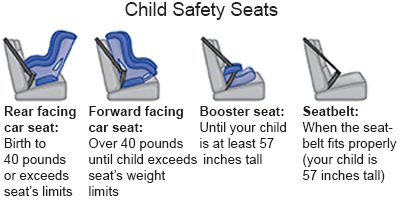
- Always put your child's car seat in the back seat. Never put your child's car seat in the front. This will help prevent him or her from being injured in an accident.
What can I do to make my home safe for my child?
- Place gates at the top and bottom of stairs. Always make sure that the gate is closed and locked. Gates will help protect your child from injury. Go up and down stairs with your child to make sure he or she stays safe on the stairs.
- Place guards over windows on the second floor or higher. This will prevent your child from falling out of the window. Keep furniture away from windows. Use cordless window shades, or get cords that do not have loops. You can also cut the loops. A child's head can fall through a looped cord, and the cord can become wrapped around his or her neck.
- Secure heavy or large items. This includes bookshelves, TVs, dressers, cabinets, and lamps. Make sure these items are held in place or nailed into the wall.
- Keep all medicines, car supplies, lawn supplies, and cleaning supplies out of your child's reach. Keep these items in a locked cabinet or closet. Call Poison Help (1-800-222-1222) if your child eats anything that could be harmful.
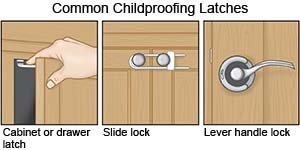
- Keep hot items away from your child. Turn pot handles toward the back on the stove. Keep hot food and liquid out of your child's reach. Do not hold your child while you have a hot item in your hand or are near a lit stove. Do not leave curling irons or similar items on a counter. Your child may grab for the item and burn his or her hand.
- Store and lock all guns and weapons. Make sure all guns are unloaded before you store them. Make sure your child cannot reach or find where weapons are kept. Never leave a loaded gun unattended.
What can I do to keep my child safe in the sun and near water?
- Always keep your child within reach near water. This includes any time you are near ponds, lakes, pools, the ocean, or the bathtub. Never leave your child alone in the bathtub or sink. A child can drown in less than 1 inch of water.
- Put sunscreen on your child. Ask your healthcare provider which sunscreen is safe for your child. Do not apply sunscreen to your child's eyes, mouth, or hands.
What are other ways I can keep my child safe?
- Follow directions on the medicine label when you give your child medicine. Ask your child's healthcare provider for directions if you do not know how to give the medicine. If your child misses a dose, do not double the next dose. Ask how to make up the missed dose.Do not give aspirin to children younger than 18 years. Your child could develop Reye syndrome if he or she has the flu or a fever and takes aspirin. Reye syndrome can cause life-threatening brain and liver damage. Check your child's medicine labels for aspirin or salicylates.
- Keep plastic bags, latex balloons, and small objects away from your child. This includes marbles and small toys. These items can cause choking or suffocation. Regularly check the floor for these objects.
- Do not let your child use a walker. Walkers are not safe for your child. Walkers do not help your child learn to walk. Your child can roll down the stairs. Walkers also allow your child to reach higher. Your child might reach for hot drinks, grab pot handles off the stove, or reach for medicines or other unsafe items.
- Never leave your child in a room alone. Make sure there is always a responsible adult with your child.
What do I need to know about nutrition for my child?
- Give your child a variety of healthy foods. Healthy foods include fruits, vegetables, lean meats, and whole grains. Cut all foods into small pieces. Ask your healthcare provider how much of each type of food your child needs. The following are examples of healthy foods:
- Whole grains such as bread, hot or cold cereal, and cooked pasta or rice
- Protein from lean meats, chicken, fish, beans, or eggs
- Dairy such as whole milk, cheese, or yogurt
- Vegetables such as carrots, broccoli, or spinach
- Fruits such as strawberries, oranges, apples, or tomatoes

- Give your child whole milk until he or she is 2 years old. Give your child no more than 2 to 3 cups of whole milk each day. His or her body needs the extra fat in whole milk to help him or her grow. After your child turns 2, he or she can drink skim or low-fat milk (such as 1% or 2% milk). Your child's healthcare provider may recommend low-fat milk if your child is overweight.
- Limit foods high in fat and sugar. These foods do not have the nutrients your child needs to be healthy. Food high in fat and sugar include snack foods (potato chips, candy, and other sweets), juice, fruit drinks, and soda. If your child eats these foods often, he or she may eat fewer healthy foods during meals. Your child may gain too much weight.
- Do not give your child foods that could cause him or her to choke. Examples include nuts, popcorn, and hard, raw vegetables. Cut round or hard foods into thin slices. Grapes and hotdogs are examples of round foods. Carrots are an example of hard foods.
- Give your child 3 meals and 2 to 3 snacks per day. Cut all food into small pieces. Examples of healthy snacks include applesauce, bananas, crackers, and cheese.
- Encourage your child to feed himself or herself. Give your child a cup to drink from and spoon to eat with. Be patient with your child. Food may end up on the floor or on your child instead of in his or her mouth. It will take time for him or her to learn how to use a spoon to feed himself or herself.
- Have your child eat with other family members. This gives your child the opportunity to watch and learn how others eat.

- Let your child decide how much to eat. Give your child small portions. Let your child have another serving if he or she asks for one. Your child will be very hungry on some days and want to eat more. For example, your child may want to eat more on days when he or she is more active. Your child may also eat more if he or she is going through a growth spurt. There may be days when he or she eats less than usual.
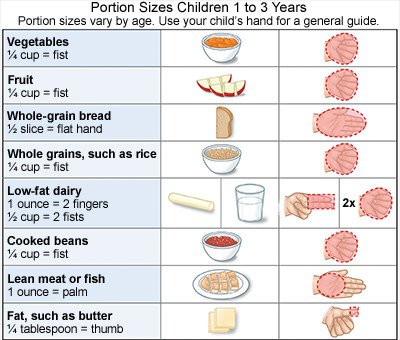
- Know that picky eating is a normal behavior in children under 4 years of age. Your child may like a certain food on one day and then decide he or she does not like it the next day. He or she may eat only 1 or 2 foods for a whole week or longer. Your child may not like mixed foods, or he or she may not want different foods on the plate to touch. These eating habits are all normal. Continue to offer 2 or 3 different foods at each meal, even if your child is going through this phase.
- Offer new foods several times. At 18 months, your child may mouth or touch foods to try them. Offer foods with different textures and flavors. You may need to offer a new food a few times before your child will like it.
What can I do to keep my child's teeth healthy?
- A child younger than 2 years needs to have his or her teeth brushed 2 times each day. Brush your child's teeth with a children's toothbrush and water. Your child's healthcare provider may recommend that you brush your child's teeth with a small smear of toothpaste with fluoride. Make sure your child spits all of the toothpaste out. Before your child's teeth come in, clean his or her gums and mouth with a soft cloth or infant toothbrush once a day.
- Thumb sucking or pacifier use can affect your child's tooth development. Talk to your child's healthcare provider if your child sucks his or her thumb or uses a pacifier regularly.
- Take your child to the dentist regularly. A dentist can make sure your child's teeth and gums are developing properly. Your child may be given a fluoride treatment to prevent cavities. Ask your child's dentist how often he or she needs to visit.
What can I do to create routines for my child?
- Have your child take at least 1 nap each day. Plan the nap early enough in the day so your child is still tired at bedtime. Your child needs 12 to 14 hours of sleep every night.
- Create a bedtime routine. This may include 1 hour of calm and quiet activities before bed. You can read to your child or listen to music. Brush your child's teeth during his or her bedtime routine.
- Plan for family time. Start family traditions such as going for a walk, listening to music, or playing games. Do not watch TV during family time. Have your child play with other family members during family time. Limit time away from home to an hour or less. Your child may become tired if an activity is longer than an hour. Your child may act out or have a tantrum if he or she becomes too tired.
What do I need to know about toilet training?
Toilet training can start between 18 and 24 months of age. Your child will need to be able to stay dry for about 2 hours at a time before you can start toilet training. He or she will also need to know wet and dry. Your child also needs to know when he or she needs to have a bowel movement. You can help your child get ready for toilet training. Read books with your child about how to use the toilet. Take your child into the bathroom with a parent or older brother or sister. Let him or her practice sitting on the toilet with his or her clothes on.
What else can I do to support my child?
- Do not punish your child with hitting, spanking, or yelling. Never shake your child. Tell your child "no." Give your child short and simple rules. Do not allow your child to hit, kick, or bite another person. Put your child in time-out for 1 to 2 minutes in his or her crib or playpen. You can distract your child with a new activity when he or she behaves badly. Make sure everyone who cares for your child disciplines him or her the same way.
- Be firm and consistent with tantrums. Temper tantrums are normal at 18 months. Your child may cry, yell, kick, or refuse to do what he or she is told. Stay calm and be firm. Reward your child for good behavior. This will encourage your child to behave well.
- Read to your child. This will comfort your child and help his or her brain develop. Point to pictures as you read. This will help your child make connections between pictures and words. Have other family members or caregivers read to your child. Your child may want to hear the same book over and over. This is normal at 18 months.
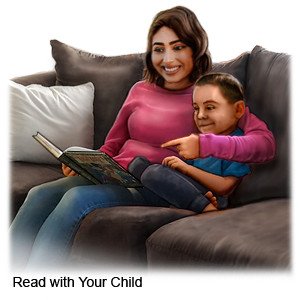
- Play with your child. This will help your child develop social skills, motor skills, and speech.
- Take your child to play groups or activities. Let your child play with other children. This will help him or her grow and develop. Your child might not be willing to share his or her toys.
- Respect your child's fear of strangers. It is normal for your child to be afraid of strangers at this age. Do not force your child to talk or play with people he or she does not know. Your child will start to become more independent at 18 months, but he or she may also cling to you around strangers.
- Limit your child's TV time as directed. Your child's brain will develop best through interaction with other people. This includes video chatting through a computer or phone with family or friends. Talk to your child's healthcare provider if you want to let your child watch TV. He or she can help you set healthy limits. Experts usually recommend less than 1 hour of TV per day for children aged 18 months to 2 years. Your provider may also be able to recommend appropriate programs for your child.
- Engage with your child if he or she watches TV. Do not let your child watch TV alone, if possible. You or another adult should watch with your child. Talk with your child about what he or she is watching. When TV time is done, try to apply what you and your child saw. For example, if your child saw someone counting blocks, have your child count his or her blocks. TV time should never replace active playtime. Turn the TV off when your child plays. Do not let your child watch TV during meals or within 1 hour of bedtime.
What do I need to know about my child's next well child visit?
Your child's healthcare provider will tell you when to bring him or her in again. The next well child visit is usually at 2 years (24 months). Contact your child's healthcare provider if you have questions or concerns about his or her health or care before the next visit. Your child may need vaccines at the next well child visit. Your provider will tell you which vaccines your child needs and when your child should get them.
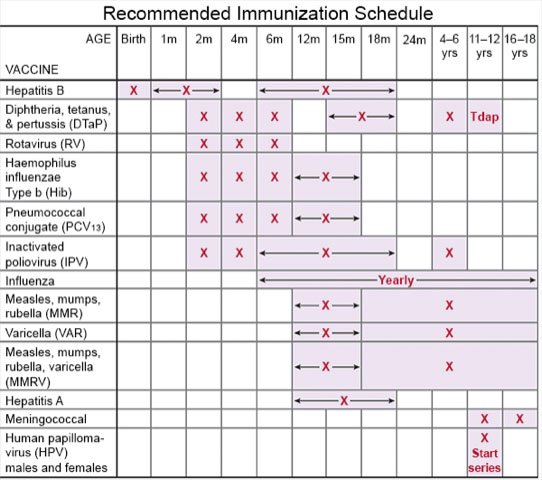 |
Care Agreement
You have the right to help plan your child's care. Learn about your child's health condition and how it may be treated. Discuss treatment options with your child's healthcare providers to decide what care you want for your child. The above information is an educational aid only. It is not intended as medical advice for individual conditions or treatments. Talk to your doctor, nurse or pharmacist before following any medical regimen to see if it is safe and effective for you.© Copyright Merative 2025 Information is for End User's use only and may not be sold, redistributed or otherwise used for commercial purposes.
Learn more about Well Child Visit at 18 Months
Care guides
Further information
Always consult your healthcare provider to ensure the information displayed on this page applies to your personal circumstances.
